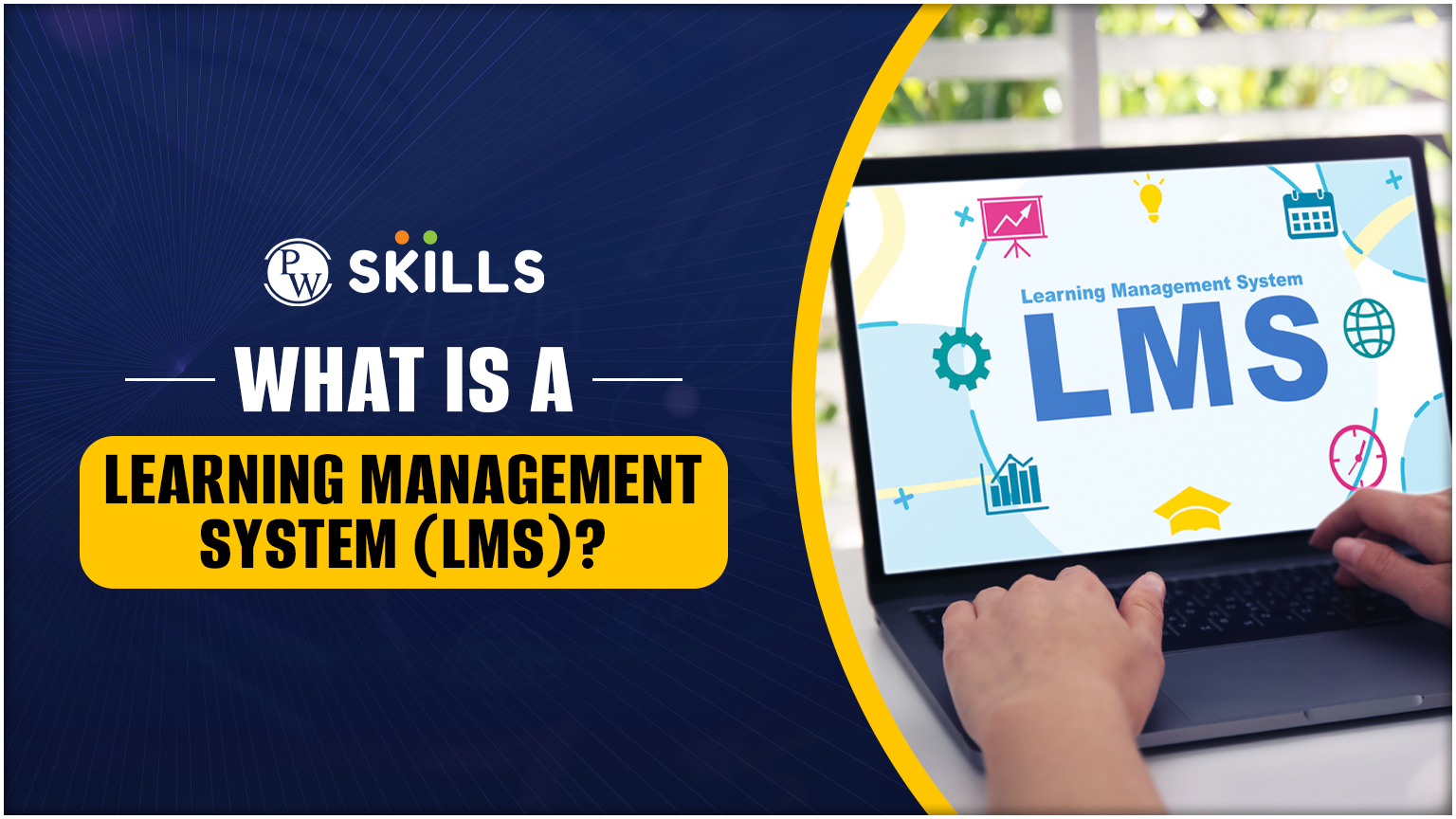The growth of the Learning Management system (LMS) applications increased at a massive scale during COVID due to the emphasis on learning on online platforms and e-learning methods. Learning online through interactive video tutorials, stories, quizzes, and projects became easy and fun with applications like LMS.
This application was initially designed to identify any training or missing learning data using data available. In this article, we are about to take a peek at the Learning Management Software and its influence on online ed-tech platforms.
What is a Learning Management System?
Learning Management System is a platform well designed for edtech institutions to help them create, manage, deliver, and track educational courses, materials, and training programs. It is also known as a Virtual Learning Environment (VLE). E-learning fuels online learning management systems dating back to the 1990s.

LMS is focused on providing online support, training, and learning platforms for instructor-led training classrooms. Modern LMSs include smart and advanced algorithms to provide auto recommendations and extract data from the user data.
What Is the Purpose of Learning Management Systems?
The Learning Management Software application is used to deliver every type of educational content online such as videos, audios, courses, workshops, boot camps, documents, and more. It also provides instructor-led training courses, discussion boards, a course outline, and more.
–
There are many LMS software with unique capabilities such as libraries, content delivery, tracking, group management, quizzes, and more. Some of the popular online LMS platforms are iSpring Learn, TalentLMS, Absorb LMS, Docebo, SkyPrep, and more. The primary goal of the LMS environment is to facilitate, manage, and enhance the overall learning experience. Some of the major uses of LMS systems are mentioned below.
- LMS provides a centralized learning platform where learners can access all training materials, course,s and resources.
- It provides accessibility and flexibility on web based or mobile applications.
- It allows educators or administrators to create, manage, and deliver courses efficiently. It includes tools for content uploading, course scheduling, and progress tracking.
- It supports self paced learning for flexibility and optimization.
- LMS facilitates interaction through discussion boards, chat rooms, and forums.
Working with Learning Management Systems (LMSs)

A Learning Management System (LMS) works as a centralized platform that manages and delivers educational content, tracks progress, and supports collaboration with multiple platforms between instructors and learners.
Setup Creation
Course instructors design courses by uploading educational tutorials in the form of videos, PDFs, slides and quizzes. Courses can be organised before getting live into modules or sections for easy navigation.
For example, week by week lessons, topic topic-based units. Learning Management Software can integrate with third party applications like Zoom, Google Meet, and other libraries.
User Management
The user friendly interface helps learners to navigate throughout the LMS platform and fulfill the goals of the user and organisation as well. User friendly interface fulfills the user experience and makes the overall UI more effective.
There are many roles listed on the application, such as instructors, learners, administrators, etc given some degree of access levels and permission.
Reports and Analytics
Learning Management Systems platform offers tools and dashboards that use data from instructors and administrators to learn the effectiveness of training programs and look for the scope of improvements. Many analytics tools are available for learners and instructors.
Support Services
The Learning Management Software support services include platforms where users and administrators can connect in online discussion boards or common integrated tools to help provide customers support services such as toll free phone numbers, dedicated email, etc.
Automation
Automation is offered on LMS applications that can automate repetitive tasks.
Artificial Intelligence
Nowadays artificial intelligence is integrated with the Learning Management System to offer advanced and efficient functionalities to users. It can help us in suggesting topics, automating, scheduling, delivery, and deployment.
Types of Learning Management System

There are many variants of Learning Management software provided based on the user’s requirements and needs.
Cloud Based LMSs
Cloud based Learning Management Systems can be worked on the internet where all vendor’s servers can be accessed on the internet. There will be no need for installation.
Also, updates and maintenance will be handled by the provider. This LMS model is best for in-house IT resources, remote learning, and more. For example, Blackboard, MoodleCloud, TalentLMS, etc.
On-Premise LMS
These types of Learning Management Systems are present on a private server which is controlled and operated by the owner under their premises. They will have high control over data and modification. Maintenance is carried out by in-house IT support engineers.
Organizations with strict data security need large internet IT teams. For example, Adobe Captivate Prime, SAP Litmos, etc.
Open Source LMS
These Learning Management Systems are available for free over the Internet and can be customized by the users. It requires low technical expertise to maintain and set up this type of Learning Management System.
It is best suited for tech savvy organizations which require tailored solutions. For example, Open edX, Moodle, etc.
Desktop Application LMSs
These Learning Management Systems applications are installed on users’ desktops which can be accessed on multiple cross devices once installed. It is best suited for offline access with interactive gaming interfaces.
Mobile App LMSs
These types of LMSs are supported in mobile environments and can be accessed via mobile devices. These platforms allow learners to access courses on their smartphones and also support offline access. It is best suited for on the go learning for remote or mobile employees.
Benefits of Learning Management System (LMS)
Some of the major benefits of Learning Management Systems are mentioned below.
- All resources and training materials on Learning Management Systems are stored in one accessible platform, ensuring consistency.
- Learners can access courses anytime, anywhere, on any device.
- The Learning Management System reduces expenses like travel, printed materials, and instructor fees.
- It also offers adaptive learning paths tailored to individual needs.
- Advanced features gamification, quizzes, and multimedia to boost learner engagement.
- It provides real-time progress tracking, performance insights, and customizable reports.
- Suitable for organizations of any size, with easy course and user management.
- Users can track mandatory training and certifications, ensuring regulatory compliance.
- Combines online and offline learning for a comprehensive experience.
- Works seamlessly with HR software, CRMs, and communication platforms.
- It reduces paper use and supports sustainable training practices.
- Instantly updates course content to provide the latest information.
- The Learning Management Software allows learners to complete training at their own speed, accommodating different learning styles.
Learn Data Analysis With PW Skills
Become proficient in data analysis and extract useful insights from data using various techniques, tools, and methods. Get in-depth tutorials, hands on learning, practice exercises, and module assignments throughout this Data Analyst Course offered on PW Skills.
Learn from dedicated mentors and master tools like Excel, SQL, Python, PowerBI, etc. Get certification from PW Skills after completing the course.
Learning Management System FAQs
Q1. What is a Learning Management System?
Ans: The Learning Management System is a platform well designed for ed tech institutions to help them create, manage, deliver and track educational courses, materials, and training programs.
Q2. What is the use of a Learning Management System?
Ans: The Learning Management System application is used to deliver every type of educational content online such as videos, audio, courses, workshops, boot camps, documents, and more.
Q3. What is Cloud based Learning Management System?
Ans: Cloud-based LMSs can work on the internet where all vendor’s servers can be accessed on the internet. There will be no need for installation.
Q4. What is an Open Source Learning Management System?
Ans: These LMS are available for free over the internet and can be customised by the users. It requires low technical expertise to maintain and set up this type of LMS.

